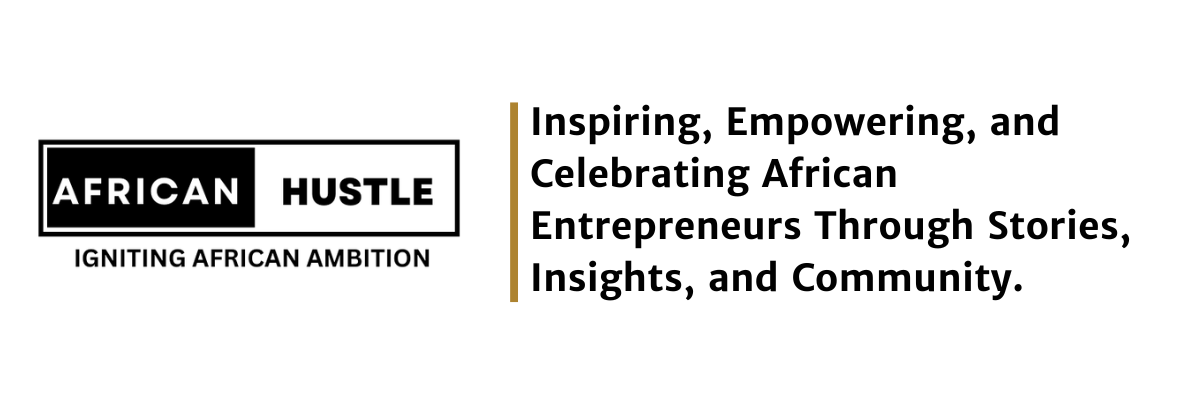
Welcome to African Hustle! Your bi-weekly dose of inspiration and smart insights into African entrepreneurship — featuring real stories about tech, culture, startups, founders, and innovations shaping the future of the continent.
Did You Know
Global military spending reached an unprecedented $2.7 trillion in 2024. In stark contrast, ending extreme poverty would cost only $70 billion annually, while eliminating absolute monetary poverty by 2030 would require around $325 billion per year.
This means we spend over eight times more on warfare than it would cost to eradicate poverty. Humanity's priorities 💩
Feature Story
There is a song by Zimbabwean artist Leonard Zhakata that has always stayed with me. Some of his lyrics really speak to me on an intimate level. Zhakata sings:
“Where there is sweat, there is peanut butter.”
It’s a simple, profoundly African phrase. Peanut butter is a staple on many tables across the continent.
Zhakata reminds us that the sweetest rewards in life come from the hardest work.
It’s a message that might feel contrarian in our current era. The gurus keep telling us to work smarter, not harder. The same gurus who are telling us AI won’t take our jobs. They talk of efficiency hacks, four-hour work weeks and endless passive income streams.
That’s all well and good, but for most entrepreneurs, there’s no avoiding the hard grind. Sweat is the price of entry.
Entrepreneurship is gruelling.
It is hard to wake up before dawn, fueled only by a vision no one else can see. It is hard to keep building when others doubt you, or worse, don’t even notice.
It is hard to carry a dream that constantly demands energy, faith, and resilience when every fibre of your being is tempted to quit.
That’s why I love Zhakata’s lyric. It reminds me that sweat is sweet.
But sweat alone doesn’t guarantee survival in business. Sometimes, you can sweat for years, only to find yourself up against giants with resources that dwarf your own.
And that’s exactly what’s happening in Africa’s retail sector today.
David and Goliath, Retail Edition
Last week, I wrote about Shoprite, the continent’s largest retailer. The Shoprite Group holds the largest market capitalisation, sales, profits, and customer base among South African retailers and has an expanding footprint across several other African countries
Shoprite is a homegrown giant, and for years, it has been the reference point for scale and operational excellence in African retail.
However, I came across news yesterday that Walmart plans to open its first branded stores in South Africa before the end of this year.
This isn’t Walmart’s first dance with Africa. In 2010, the American behemoth acquired a majority stake in Massmart, a South African retail group that operates brands like Makro, Game, Builders Warehouse, Cambridge Food, and more. Massmart is no small player; it has 411 stores across South Africa and 12 other Sub-Saharan countries.
For years, African consumers shopped at Makro or Game without necessarily connecting the dots to Bentonville, Arkansas, where Walmart’s global headquarters sit.
That’s about to change, now that Walmart wants its brand front and centre.
A Sobering Comparison
Let’s put this in perspective.
Employees: Shoprite has 163,000. Walmart employs over 2.1 million people worldwide.
Stores: Shoprite runs 3,400 stores across 7 countries. Walmart operates more than 10,750 stores across 19 countries.
Revenue: Shoprite posted around $14 billion last year. Walmart raked in a staggering $681 billion.
The gulf is enormous. Shoprite is a continent-wide success story, but compared to Walmart, it is still a minnow.
So what happens when Goliath decides to set up shop on David’s turf?
The Stakes for African Retail
Walmart’s entry into South Africa and potentially deeper into Africa raises big questions.
Since Walmart has been accused of predatory pricing in the past, what are the chances of it undercutting prices, forcing Shoprite and others to squeeze margins even further?
Yes, we love low prices, but won’t this also draw customers away from smaller businesses?
While we benefit from lower prices and better selection, what will happen to the small suppliers and local producers? It will be a sad day in Africa if local suppliers are pressured to supply goods below cost or be squeezed out of the supply chain.
Walmart is the largest importer in the United States in many categories, such as electronics and fast-moving consumer goods. What will happen to our small manufacturers and local businesses if Walmart excessively relies on Chinese-produced products?
What does this mean for African entrepreneurs trying to build their own empires?
Because the Walmart vs Shoprite battle will be more than a retail story. It will stand as a metaphor for what every African entrepreneur faces: building something with sweat equity in a world where global giants can swoop in with capital, technology, and scale.
Competing with Giants
So, what can African hustlers learn from the soon-to-come confrontation between Shoprite and Walmart?
Play to Your Local Advantage.
Shoprite knows Africa better than Walmart ever will. It understands informal markets, regional tastes, and logistical nightmares that outsiders underestimate. That’s its edge. For entrepreneurs, the lesson is the same: you may not outspend global competitors, but you can serve your local market better.Customer Intimacy Beats Corporate Scale.
Giants tend to treat markets as numbers. Locals treat them as relationships. The small retailer who knows every customer’s name will survive longer than the faceless giant that doesn’t care.Agility Over Bureaucracy.
Walmart is a machine. But machines are slow to pivot. Shoprite and African entrepreneurs in general can win by moving faster, innovating on the fly, and adapting to shifting conditions.Community Trust Matters.
Africans tend to root for their own. A Nigerian will often prefer Dangote cement over a foreign brand, not just out of patriotism but trust. Entrepreneurs who build businesses that feel authentically local will always have a fighting chance.
Should Africa Protect Its Own?
This Walmart vs Shoprite battle also raises a policy debate: Should Africa shield local champions from global competition, or should the market be left wide open?
On one hand, protectionism feels necessary. If Walmart steamrolls Shoprite, does Africa really win? Lower prices in the short-term, maybe. But what about the long-term impact of a weakened Shoprite or a hollowed-out retail sector that loses its African ownership?
On the other hand, shielding local businesses can make them complacent. Without global competition, will Shoprite stay innovative, customer-centric, and efficient? Or will it stagnate, knowing it doesn’t have to fight to survive?
The China Playbook
China offers one of the clearest case studies in economic strategy. In its rise to becoming the world’s second-largest economy, China wasn’t shy about restricting foreign players.
Facebook, Instagram, WhatsApp, Twitter, and YouTube are all banned.
Google is heavily restricted.
Amazon’s presence is limited.
Instead, China nurtured its own equivalents. WeChat, Alibaba, Baidu and Tencent. Today, these companies are global powerhouses.
Did China miss out on consumer choice? Maybe. But it gained something far more valuable — homegrown giants with global reach.
Should Africa adopt a similar approach?
Imagine if, 10 years ago, governments had blocked Uber from entering African markets. Would we today have a pan-African ride-hailing giant with the scale of Didi in China?
Sweat to Scale
You must sweat to achieve worthwhile success. As Zhakata sang, Sweat is sweet.
But we do not need to just sweat over the small stuff. We must scale.
In a global economy, the player with billions in capital and millions of employees has an undeniable advantage.
Our challenge is how to turn sweat into scale, how to transform hard work into institutions that can stand toe-to-toe with global giants.
Shoprite is one of the best examples of that journey. But even Shoprite, with all its size and dominance in Africa, looks small when compared to Walmart.
Your business today may feel like Shoprite in 1979, when it was just eight stores in Cape Town. Back then, nobody could have imagined it would become a pan-African giant.
But Shoprite sweated. It put in the grind, the logistics, the strategy, the persistence. And peanut butter followed.
So when you’re up at 2 a.m., exhausted, discouraged, wondering if your vision is even worth it, remember Zhakata’s words.
Where there is sweat, there is peanut butter.
Quote of the Week
Make a pact with yourself today to not be defined by your past. Sometimes the greatest thing to come out of all your hard work isn't what you get for it, but what you become for it.
Opportunity Alert
Real Estate Investment Opportunity
Africa's residential real estate market is valued at US$17.64 billion and is projected to reach US$21.92 trillion by 2029. Despite this boom, home ownership remains extremely low in urban areas.
Urban African home ownership rates average only 10-20%, compared to 70% in Europe and North America. Major barriers include limited mortgage access, high upfront costs, and complex property acquisition processes. Cities like Cape Town, Nairobi, Lagos, and Accra have become expensive markets due to rapid urbanisation.
Entrepreneurs are developing creative financing models to address affordability issues:
Rent-to-own programs: Companies like Uganda's Smart Havens Africa allow tenants to gradually pay off property costs while renting, targeting single mothers and low-income households
Fractional ownership: Nigeria's VANK uses blockchain and crowdfunding to enable group property purchases, allowing investments as low as $100 for a share of expensive properties
Africa faces a deficit of at least 51 million housing units, with the largest shortages. This supply-demand gap creates significant opportunities for developers and investors. The combination of growing demand, severe housing shortages, and innovative financing solutions positions Africa's residential real estate as both a major challenge and investment opportunity.
Practical Tools
Framer
Framer is a no-code, design-centric website builder that gives designers full creative control. It offers an intuitive, Figma-like canvas, a powerful integrated CMS, built-in SEO optimisation, and instant publishing.
Hustle Trivia
Which is the largest company in Africa by revenue?
(Sonatrach, the state-owned oil and gas company of Algeria, with annual revenues reported at around $77 billion)
Founder Insights
Operational and Leadership Best Practices
Build a strong, positive culture with clear communication and values.
Delegate and empower your team, but don’t abdicate responsibility.
Balance visionary leadership with focus and discipline.
Be comfortable putting yourself out there; founder visibility and authenticity go a long way in fundraising, hiring, and customer trust.
Hustler’s Cheat Sheet
Ditch Connection hoarding:
↳ Make warm, strategic intros
↳ Pass on opportunities you can’t take
↳ Proactively recommend others for roles
Community Billboard
2025 World Bank GovTech Innovation Challenge

Applications are now open for the 2025 World Bank GovTech Innovation Challenge.
The GovTech Innovation Challenge is a pilot programme connecting government partners with innovative technology companies to address critical public sector challenges.
This initiative mobilises startups and SMEs to develop practical solutions that enhance government efficiency, transparency, and citizen services through digital transformation.
Application Deadline: September 19, 2025, 23:59 CET
Afrofact
Between 2016 and 2023, the number of foreign embassies & consulates in Africa jumped from 930 to 1,136 (+22%). That’s 200+ new diplomatic missions in just 7 years, reflecting the continent’s growing strategic, economic & political importance.
Strategies & Philosophy
Value-Based Strategy
A value-based strategy involves pricing products or services based on the perceived value to the customer rather than strictly on production costs or market trends.
Companies using this approach focus on delivering unique benefits that justify a higher price, often by enhancing quality, brand experience, or customer service, making the customer feel the product is worth the premium.
Proverb of the Week
However much the buttocks are in a hurry, they will always remain behind
Enjoyed this post? Share it with someone who might find it helpful and encourage them to subscribe!
If we missed something, we’d love to hear from you — hit reply and let us know what insights you want us to dive into next.
And if this email was forwarded to you, you can sign up here!

